Serving 40 students in grades Prekindergarten-12, Pied Piper School ranks in the top 30% of all schools in Michigan for overall test scores (math proficiency is top 20%, and reading proficiency is top 20%).
The percentage of students achieving proficiency in math is <50% (which is higher than the Michigan state average of 34%). The percentage of students achieving proficiency in reading/language arts is ≥50% (which is higher than the Michigan state average of 45%).
The student:teacher ratio of 6:1 is lower than the Michigan state level of 17:1.
Minority enrollment is 5% of the student body (majority American Indian), which is lower than the Michigan state average of 37% (majority Black).
Quick Stats (2025)
- School Type: Special education school
- Grades: Prekindergarten-12
- Enrollment: 40 students
- Student:Teacher Ratio: 6:1
- Minority Enrollment: 5%
- Overall Testing Rank: Top 30% in MI
- Math Proficiency: <50% (Top 20%)
- Reading Proficiency: ≥50% (Top 50%)
- Science Proficiency: ≥50% (Top 30%)
- Source: National Center for Education Statistics (NCES), MI Dept. of Education
Top Rankings
Pied Piper School ranks among the top 20% of public schools in Michigan for:
Category
Attribute
Math Proficiency
Community Size
Student Attention
School Overview
Pied Piper School's student population of 40 students has grown by 21% over five school years.
The teacher population of 7 teachers has grown by 40% over five school years.
School Type
Grades Offered
Grades Prekindergarten-12
Total Students
40 students
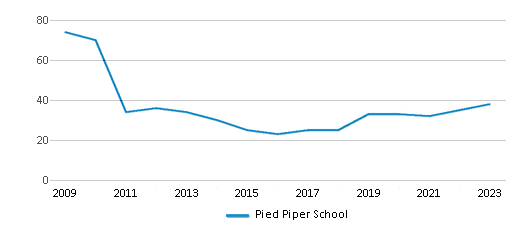
Gender %
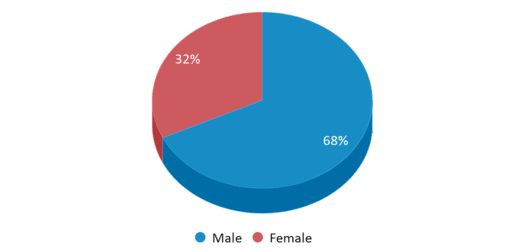
Total Classroom Teachers
7 teachers
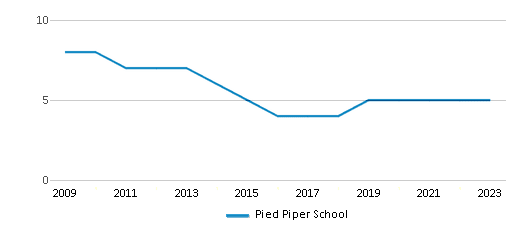
Students by Grade
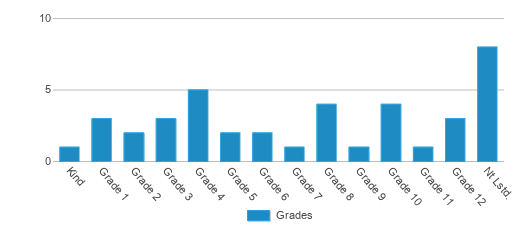
School Rankings
Pied Piper School ranks within the top 30% of all 3,069 schools in Michigan (based off of combined math and reading proficiency testing data).
The diversity score of Pied Piper School is 0.10, which is less than the diversity score at state average of 0.56. The school's diversity has stayed relatively flat over five school years.
Overall Testing Rank
#761 out of 3069 schools
(Top 30%)
(Top 30%)
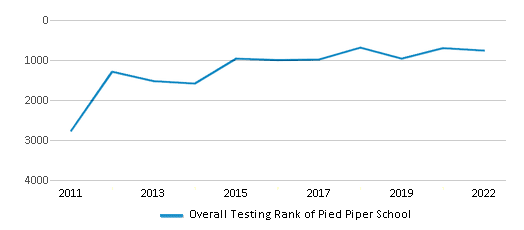
Math Test Scores (% Proficient)
<50%
34%
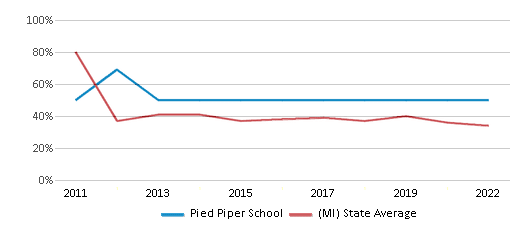
Reading/Language Arts Test Scores (% Proficient)
≥50%
45%
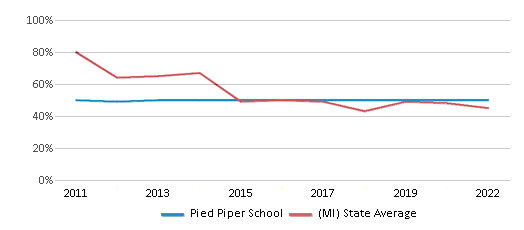
Science Test Scores (% Proficient)
≥50%
38%
Student : Teacher Ratio
6:1
17:1
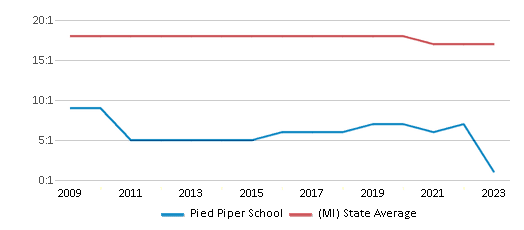
American Indian
3%
1%
Asian
n/a
4%
Hispanic
2%
9%
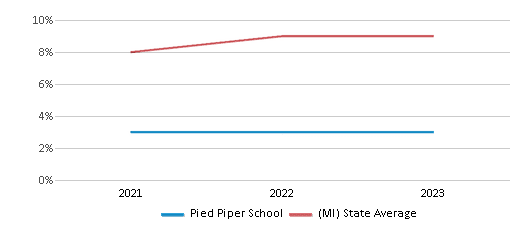
Black
n/a
18%
White
95%
63%
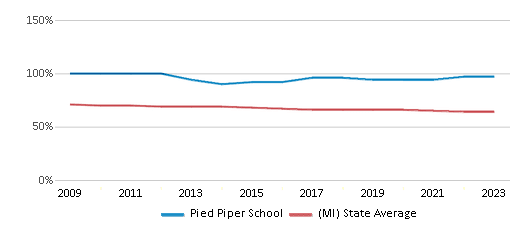
Hawaiian
n/a
n/a
Two or more races
n/a
5%
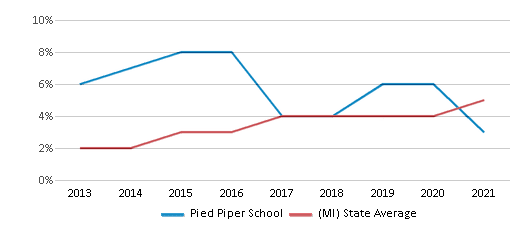
All Ethnic Groups
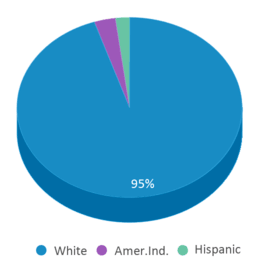
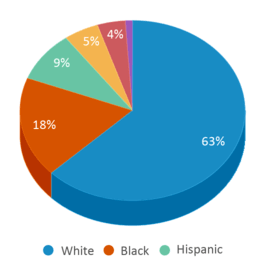
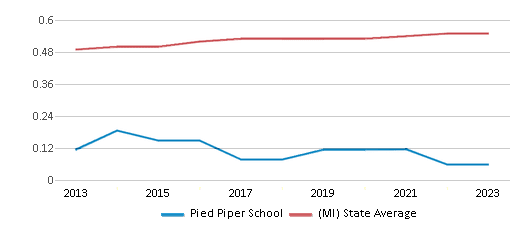
Participates in the National School Lunch Program (NSLP)
Yes
Eligible for Free Lunch
75%
50%
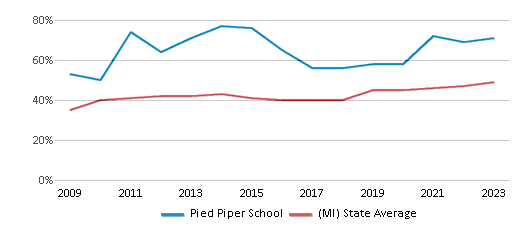
Eligible for Reduced Lunch
3%
4%
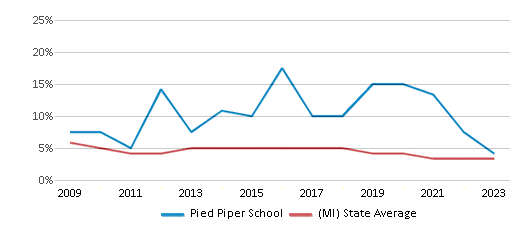
School Statewide Testing
School District Name
Source: National Center for Education Statistics (NCES), MI Dept. of Education
Profile last updated: 02/09/2025
Frequently Asked Questions
What is Pied Piper School's ranking?
Pied Piper School is ranked #761 out of 3,069 schools, which ranks it among the top 30% of public schools in Michigan.
What percent of students have achieved state testing proficiency in math and reading?
<50% of students have achieved math proficiency (compared to the 34% MI state average), while ≥50% of students have achieved reading proficiency (compared to the 45% MI state average).
How many students attend Pied Piper School?
40 students attend Pied Piper School.
What is the racial composition of the student body?
95% of Pied Piper School students are White, 3% of students are American Indian, and 2% of students are Hispanic.
What is the student:teacher ratio of Pied Piper School?
Pied Piper School has a student ration of 6:1, which is lower than the Michigan state average of 17:1.
What grades does Pied Piper School offer ?
Pied Piper School offers enrollment in grades Prekindergarten-12
What school district is Pied Piper School part of?
Pied Piper School is part of Alpena-Montmorency-Alcona ESD School District.
School Reviews
5 9/26/2007
We moved to Alpena with no expectation of having quality special education for my son. Afterall, we were moving from the "big city" to, what I considered to be, the middle of nowhere.
I cannot sing the praises of Pied Piper enough! What a fantastic, absolutely fantastic school for our kiddos iwth special needs. An absolute gem..unfortunatly, we had to move away, and I STILL wish we could return. My son arrived in Sue Srebnik's classroom unable to walk, unable to eat on his own and unable (I thought) to be potty trained. Within a YEAR, Sue and the staff had my son walking with a walker, totally potty trained and..eating with a fork and spoon! Your kids have potential that cannot be reached in a "regular ed" setting and Pied Piper and the staff will unlock it.
I love that as the kids get older, they help them with living skills, since, afterall, our kids need to be independent at some point.
The school has their own prom, great field trips etc.
We miss this school and just cannot say enough about it...
Review Pied Piper School. Reviews should be a few sentences in length. Please include any comments on:
- Quality of academic programs, teachers, and facilities
- Availability of music, art, sports and other extracurricular activities
Recent Articles

What Is A Charter School?
Explore the world of charter schools in this comprehensive guide. Learn about their history, how they operate, and the pros and cons of this educational innovation. Discover key facts about charter schools, including admission policies, demographics, and funding, as well as what to look for when considering a charter school for your child.

10 Reasons Why High School Sports Benefit Students
Discover the 10 compelling reasons why high school sports are beneficial for students. This comprehensive article explores how athletics enhance academic performance, foster personal growth, and develop crucial life skills. From improved fitness and time management to leadership development and community representation, learn why participating in high school sports can be a game-changer for students' overall success and well-being.

February 05, 2025
Understanding the U.S. Department of Education: Structure, Impact, and EvolutionWe explore how the Department of Education shapes American education, from its cabinet-level leadership to its impact on millions of students, written for general audiences seeking clarity on this vital institution.









